(英语)初中英语倒装句练习题
七年级英语倒装句运用练习题30题

七年级英语倒装句运用练习题30题1<背景文章>There was a great event at our school last week. In the schoolyard, here and there were colorful balloons. Not only were the students excited, but also the teachers. Under a big tree, there stood a stage. On the stage, many students were performing. Here came the dancers, dancing gracefully. There went the singers, singing beautifully.The audience was amazed by the wonderful performances. Suddenly, there rang a loud applause. Everyone was having a great time.1. Not only were the students excited, but also the teachers. This is an example of _______.A. normal sentenceB. interrogative sentenceC. inverted sentenceD. exclamatory sentence答案:C。
中文解析:这句话“Not only were the students excited, but also the teachers.”是一个倒装句的例子,所以选C。
2. There stood a stage. The underlined part is _______.A. a subjectB. a predicateC. an objectD. an adverbial答案:A。
初中英语倒装句练习题
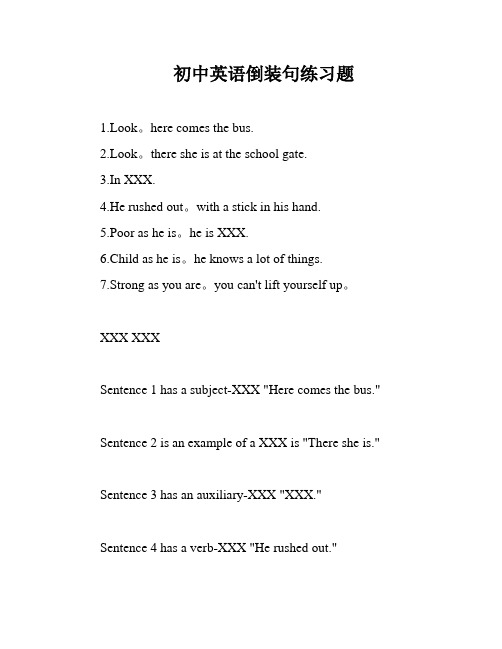
初中英语倒装句练习题1.Look。
here comes the bus.2.Look。
there she is at the school gate.3.In XXX.4.He rushed out。
with a stick in his hand.5.Poor as he is。
he is XXX.6.Child as he is。
he knows a lot of things.7.Strong as you are。
you can't lift yourself up。
XXX XXXSentence 1 has a subject-XXX "Here comes the bus." Sentence 2 is an example of a XXX is "There she is." Sentence 3 has an auxiliary-XXX "XXX." Sentence 4 has a verb-XXX "He rushed out."Sentence 5 XXX is "Poor as he is。
he is honest."Sentence 6 XXX is "Child as he is。
he knows a lot of things."Sentence 7 XXX correct answer is "Strong as you are。
you can't lift yourself up."8.XXX)9.The news came early in the day that the enemy were gone。
(XXX)10.Only by learning them well can you realize the XXX)11.They began to be treated as human XXX)12.He was not only forced to stay at home。
英语中考英语倒装句专项练习
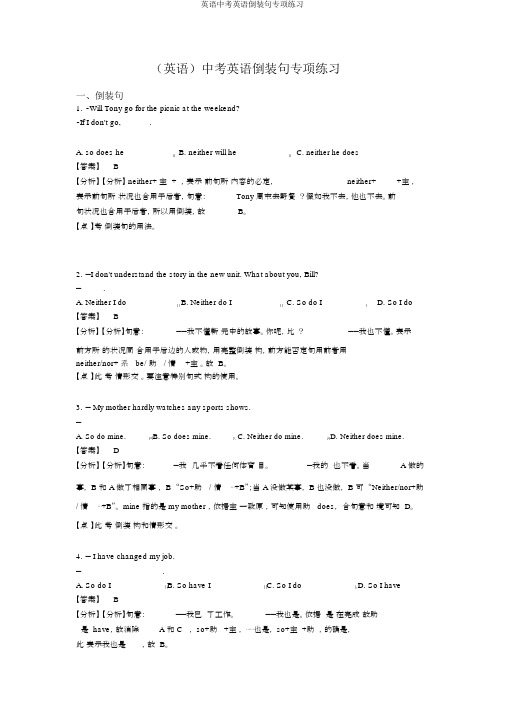
(英语)中考英语倒装句专项练习一、倒装句1.–Will Tony go for the picnic at the weekend?–If I don't go, ______.A. so does heB. neither will heC. neither he does【答案】B【分析】【分析】 neither+ 主 +,表示前句所内容的必定,neither++主,表示前句所状况也合用于后者,句意:Tony 周末去野餐?假如我不去,他也不去。
前句状况也合用于后者,所以用倒装,故B。
【点】考倒装句的用法。
2.—I don't understand the story in the new unit. What about you, Bill?—_____.A. Neither I doB. Neither do IC. So do ID. So I do 【答案】B【分析】【分析】句意:——我不懂新元中的故事。
你呢,比?——我也不懂。
表示前方所的状况同合用于后边的人或物,用完整倒装构,前方能否定句用前者用neither/nor+ 系 be/ 助 / 情 +主。
故 B。
【点】此考情形交。
要注意特别句式构的使用。
3.— My mother hardly watches any sports shows.—_________A. So do mine.B. So does mine.C. Neither do mine.D. Neither does mine.【答案】D【分析】【分析】句意:—我几乎不看任何体育目。
—我的也不看。
当 A 做的事, B 和 A 做了相同事, B “So+助 / 情⋯+B”;当 A 没做某事, B 也没做, B 可“Neither/nor+助/ 情⋯+B”。
mine 指的是 my mother ,依据主一致原,可知使用助 does,合句意和境可知 D。
50套初中英语倒装句

50套初中英语倒装句一、倒装句1.Only _________ save his life.A. can the doctorB. the doctor canC. will the doctorD. could the doctor【答案】 B【解析】【分析】句意:只有医生能挽救他的生命。
分析:only的倒装中一定注意他的用法,只有当only+状语(从句)至句首是才倒装这儿很明显是在强调主语doctor所以不用倒装,故选B【点评】倒装句的用法。
2.—He's never been late for school.—________________.A. So have IB. So am IC. Neither have ID. Nor am I【答案】 C【解析】【分析】句意:—他从来没有上学迟到过。
—我也没有。
So+助动词+主语,表示主语也是;neither+助动词+主语,表示主语也不是这样;根据上文是现在完成时,这里用助动词have。
根据题意,故选C。
【点评】考查固定句型neither+谓+主。
3.— My mother hardly watches any sports shows.—_________A. So do mine.B. So does mine.C. Neither do mine.D. Neither does mine.【答案】 D【解析】【分析】句意:—我妈妈几乎不看任何体育节目。
—我的妈妈也不看。
当A做的事,B和A做了相同事时,B说“So+助动词/情态动词…+B”;当A没做某事,B也没做,B 可说“Neither/nor+助动词/情态动词…+B”。
mine指的是my mother,根据主谓一致原则,可知使用助动词does,结合句意和语境可知选D。
【点评】此题考查倒装结构和情景交际。
4.—Many students won 't take part in the after-school activities today.— .We have so much homework to do!A. So will IB. So do IC. Neither will ID. Neither do I【答案】 C【解析】【分析】句意:—今天许多学生不愿意参见课外活动。
【英语】初中英语倒装句的技巧及练习题及练习题(含答案).docx

A. Neither are weB. Neither do weC. So are weD. So do we
【答案】A
【解析】 【分析】句意:—我 在学校会 上不被允 任何零食和 料。—我 也是。
根据We are not allowed可知此 表示否定,并且助 用are,故表示我 也不被允 ,
---_________________
A. So do I
B. So am I
C. Neither am I
D. Neither do I
【答案】
A
【解析】 【分析】So do I我也一 ;So am I.我也是;Neither am I我也不;Neither do I
我也不。句意:彼得 儿的 多人。 合 境可知上文 一般 在 ,主 构,故A。
某某也不neither +助动词+主语;so +主语+助动词/情态动词/系动词+主语:某某确实如此,与上文是同一人。该句式在时态,人称上与前一个句子相同。上句是肯定句,故选
A。
【点评】考查倒装句。
16. —Will you go to the party tomorrow?
—If you go, ______. If you don't, _______. A. so will I, neither will I
3.句型中助 ,包括 系 和情 的 要和上句中 的 相一致。另一句型so+主+助 是指 上文的肯定,起加 作用。
13. —Jim enjoys listening to pop music.
—_______________.
A. So does Helen.B. Also is HelenC. Helen likes alsoD. So Helen does
中考英语倒装句练习题(附答案)

典型例题: (1) Not until the early years of the 19th century___ what heat is. A. man did know B. man knew C. didn‘t man know D. did man know 答案为D. 否定词Not在句首,要求用部分倒装的句子结构。
注意:只有当Not only… but also连接两个分句时,才在第一个分句用倒装结构。如果置于句首的Not only… but also仅连接两个并列词语,不可用倒装结构。
01
Not only you but also I am fond of music.
01
so, neither, nor作部分倒装。
Not until the early years of the 19th century ___ what heat is.
答案D。看到Not until…的句型,我们知道为一倒装句,答案在C,D 中选一个。
A. man did know B. man know C. didn‘t man know D. did man know
01
Try hard as he will, he never seems able to do the work satisfactorily.
02
注意:
注意:
01
让步状语从句中,有though,although时,后面的主句不能有but,但是 though 和yet可连用。
02
其他部分倒装。
Not until I began to work ___ how much time I had wasted.
didn‘t I realize
七年级英语倒装句运用练习题30题
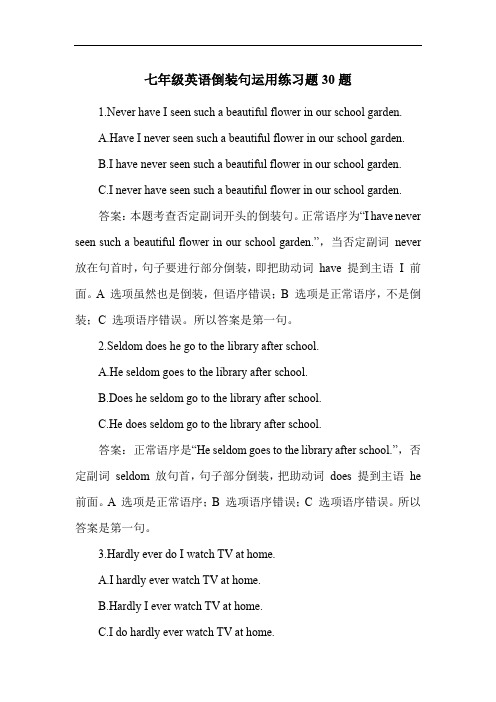
七年级英语倒装句运用练习题30题1.Never have I seen such a beautiful flower in our school garden.A.Have I never seen such a beautiful flower in our school garden.B.I have never seen such a beautiful flower in our school garden.C.I never have seen such a beautiful flower in our school garden.答案:本题考查否定副词开头的倒装句。
正常语序为“I have never seen such a beautiful flower in our school garden.”,当否定副词never 放在句首时,句子要进行部分倒装,即把助动词have 提到主语I 前面。
A 选项虽然也是倒装,但语序错误;B 选项是正常语序,不是倒装;C 选项语序错误。
所以答案是第一句。
2.Seldom does he go to the library after school.A.He seldom goes to the library after school.B.Does he seldom go to the library after school.C.He does seldom go to the library after school.答案:正常语序是“He seldom goes to the library after school.”,否定副词seldom 放句首,句子部分倒装,把助动词does 提到主语he 前面。
A 选项是正常语序;B 选项语序错误;C 选项语序错误。
所以答案是第一句。
3.Hardly ever do I watch TV at home.A.I hardly ever watch TV at home.B.Hardly I ever watch TV at home.C.I do hardly ever watch TV at home.答案:正常语序是“I hardly ever watch TV at home.”,hardly ever 放句首,部分倒装,助动词do 提到主语I 前面。
初三英语倒装句分类练习题30题
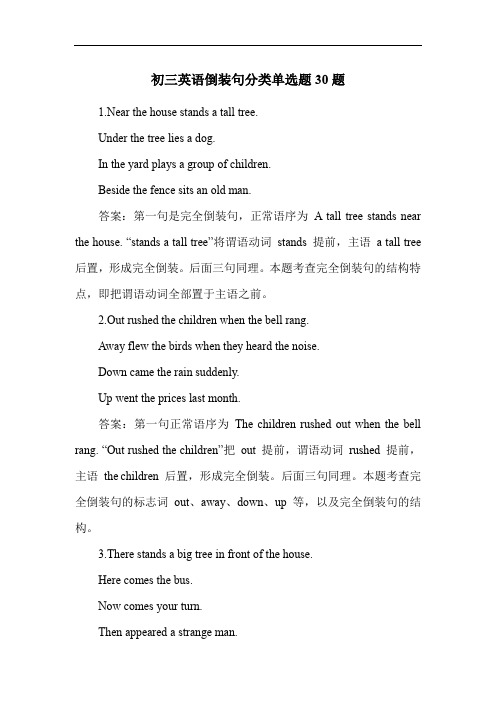
初三英语倒装句分类单选题30题1.Near the house stands a tall tree.Under the tree lies a dog.In the yard plays a group of children.Beside the fence sits an old man.答案:第一句是完全倒装句,正常语序为 A tall tree stands near the house. “stands a tall tree”将谓语动词stands 提前,主语a tall tree 后置,形成完全倒装。
后面三句同理。
本题考查完全倒装句的结构特点,即把谓语动词全部置于主语之前。
2.Out rushed the children when the bell rang.Away flew the birds when they heard the noise.Down came the rain suddenly.Up went the prices last month.答案:第一句正常语序为The children rushed out when the bell rang. “Out rushed the children”把out 提前,谓语动词rushed 提前,主语the children 后置,形成完全倒装。
后面三句同理。
本题考查完全倒装句的标志词out、away、down、up 等,以及完全倒装句的结构。
3.There stands a big tree in front of the house.Here comes the bus.Now comes your turn.Then appeared a strange man.答案:第一句不是完全倒装句,there be 句型是固定用法,不是倒装。
后面三句是完全倒装句,正常语序分别为The bus comes here. Your turn comes now. A strange man appeared then. 本题考查there be 句型和完全倒装句的区别。
初三英语倒装句分类练习题30题

初三英语倒装句分类练习题30题1.Near the house stands a tall tree.A.tall tree stands a houseB.a house stands a tall treeC.a tall tree a house standsD.stands a tall tree near the house答案:D。
完全倒装句结构是将谓语动词提到主语前面。
A 选项语序错误。
B 选项不是倒装句语序。
C 选项语序混乱。
D 选项正确地将谓语stands 提到了主语a tall tree 前面。
2.Under the table lies a cat.A.a cat lies under the tableB.under the table a cat liesC.lies a cat under the tableD.a cat under the table lies答案:C。
完全倒装句结构是将谓语动词提到主语前面,地点状语置于句末。
A 选项不是倒装句语序。
B 选项语序错误。
C 选项正确地将lies 提到了主语a cat 前面,under the table 置于句末。
D 选项语序混乱。
3.On the wall hangs a picture.A.a picture hangs on the wallB.on the wall a picture hangsC.hangs a picture on the wallD.a picture on the wall hangs答案:C。
完全倒装句结构是将谓语动词提到主语前面,地点状语置于句末。
A 选项不是倒装句语序。
B 选项语序错误。
C 选项正确地将hangs 提到了主语a picture 前面,on the wall 置于句末。
D 选项语序混乱。
4.In the garden are many flowers.A.many flowers are in the gardenB.in the garden many flowers areC.are many flowers in the gardenD.many flowers in the garden are答案:C。
初三英语倒装句深度练习单选题40题
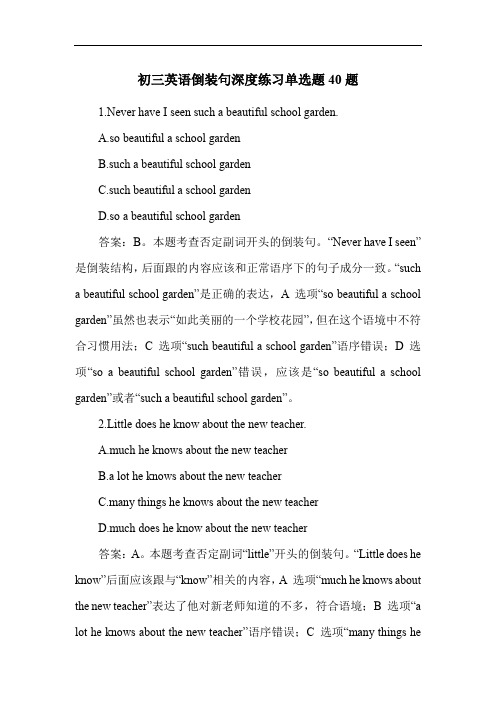
初三英语倒装句深度练习单选题40题1.Never have I seen such a beautiful school garden.A.so beautiful a school gardenB.such a beautiful school gardenC.such beautiful a school gardenD.so a beautiful school garden答案:B。
本题考查否定副词开头的倒装句。
“Never have I seen”是倒装结构,后面跟的内容应该和正常语序下的句子成分一致。
“such a beautiful school garden”是正确的表达,A 选项“so beautiful a school garden”虽然也表示“如此美丽的一个学校花园”,但在这个语境中不符合习惯用法;C 选项“such beautiful a school garden”语序错误;D 选项“so a beautiful school garden”错误,应该是“so beautiful a school garden”或者“such a beautiful school garden”。
2.Little does he know about the new teacher.A.much he knows about the new teacherB.a lot he knows about the new teacherC.many things he knows about the new teacherD.much does he know about the new teacher答案:A。
本题考查否定副词“little”开头的倒装句。
“Little does he know”后面应该跟与“know”相关的内容,A 选项“much he knows about the new teacher”表达了他对新老师知道的不多,符合语境;B 选项“a lot he knows about the new teacher”语序错误;C 选项“many things heknows about the new teacher”与题干表达不一致;D 选项“much does he know about the new teacher”语序错误。
七年级英语倒装句练习题50题

七年级英语倒装句练习题50题1.Never have I seen such a beautiful campus.A.Seldom have IB.Rarely have IC.Hardly have ID.Sometimes have I答案:C。
本题考查否定副词开头的倒装句。
否定副词never、seldom、rarely、hardly 等位于句首时,句子要部分倒装,即将助动词、be 动词或情态动词提到主语之前。
选项A、B、C 都是正确的倒装形式,选项D 不是倒装形式,所以错误。
本句意思是“我从未见过如此美丽的校园”。
2.Little does he know about the new project.A.Few does heB.Small does heC.Rare does heD.Much does he答案:A。
否定副词little、few 等位于句首时,句子要部分倒装。
选项 A 是正确的倒装形式,选项B、C、D 都不是倒装形式,所以错误。
本句意思是“他对这个新项目知之甚少”。
3.Seldom do we have such a busy day.A.Rarely do weB.Hardly do weC.Often do weD.Never do we答案:B。
seldom、rarely、hardly、never 等否定副词位于句首时,句子部分倒装。
选项A、B、D 都是倒装形式,选项C 不是倒装形式。
often 是肯定副词,不能用于倒装句。
本句意思是“我们很少有这么忙碌的一天”。
4.Hardly had we started the class when the bell rang.A.Scarcely had weB.Rarely had weC.Seldom had weD.Often had we答案:A。
hardly/scarcely...when...表示“一……就……”,位于句首时,句子部分倒装。
初三英语倒装句练习题20题(带答案)
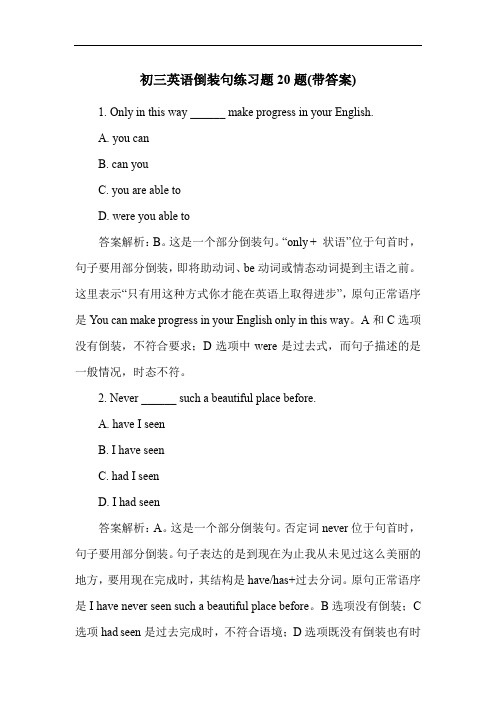
初三英语倒装句练习题20题(带答案)1. Only in this way ______ make progress in your English.A. you canB. can youC. you are able toD. were you able to答案解析:B。
这是一个部分倒装句。
“only + 状语”位于句首时,句子要用部分倒装,即将助动词、be动词或情态动词提到主语之前。
这里表示“只有用这种方式你才能在英语上取得进步”,原句正常语序是You can make progress in your English only in this way。
A和C选项没有倒装,不符合要求;D选项中were是过去式,而句子描述的是一般情况,时态不符。
2. Never ______ such a beautiful place before.A. have I seenB. I have seenC. had I seenD. I had seen答案解析:A。
这是一个部分倒装句。
否定词never位于句首时,句子要用部分倒装。
句子表达的是到现在为止我从未见过这么美丽的地方,要用现在完成时,其结构是have/has+过去分词。
原句正常语序是I have never seen such a beautiful place before。
B选项没有倒装;C 选项had seen是过去完成时,不符合语境;D选项既没有倒装也有时态错误。
3. Here ______ the bus.A. comeB. comesC. comingD. is come答案解析:B。
这是一个完全倒装句。
当表示地点的副词here位于句首时,如果句子的主语是名词,句子要用完全倒装,即谓语动词提到主语之前。
主语the bus是第三人称单数,所以谓语动词用comes。
A选项come没有用第三人称单数形式;C选项coming是非谓语形式,不能作谓语;D选项is come表达错误。
(完整word版)初中英语倒装句练习题

初中英语倒装句练习1.Look,________.e....B.her.i.th.bu.coninge.th.bu....ing2.—Wher.i.Kate.—Look, _____.sh.i.a.th.schoo.gate..A.ther.sh.i.B.ther.i.sh.C.her.yo.ar.D.her.i.is3.Whic.o.th.followin.sentence.i.correct?A.I.th.teache.cam.....th.teacher...D.I.cam.th.teacher4.Ou._____.wit..stic.i.hi.hand.A.di.h.rus.B.rushe.h.C.h.rushe.D.h.di.rush5._______.h.i.honest.A.A.h.i.poo..B.Poo.i.h..C.Poo.a.h.i..D.Poo.a.i.he6.________.h.know..lo.o.things.A..chil.a.h.i..B.Chil.a.h.i.C..chil.a.i.h.D.Chil.a.i.he7._____.yo.can’.lif.yoursel.up.A.Eve.you’r.stron...B.Stron.a.yo.areC.Ho.stron.yo.ar...D.I.spit.you’r.strong8.S.carelessl.________tha.h.almos.kille.himself.A.h.drive.B.h.drov.C.doe.h.driv.D.di.h.drive9.Earl.i.th.da.____th.new._____th.enem.wer.gone.e.tha.B.came.tha.es.tha.D.came.whatnguages____.the.well.A.yo.ca.lear..B.ca.yo.lear.C.yo.learne.D.di.yo.learn11.Onl.afte.liberatio.____.t.b.treate.a.huma.beings.A.di.the.begi.B.the.ha.begu.C.the.di.begi.D.ha.the.begun12.No.onl.___.t.sta.a.home.bu.h.wa.als.forbidde.t.se.hi.friends.A.h.wa.forcin..B.h.wa.force..C.wa.h.forcin.D.wa.h.forced13.No.unti.hi.fathe.wa.ou.o.prison___.t.school.A.ca.Joh.g.B.Joh.ca.g.C.coul.Joh.g.D.Joh.coul.go14.Neve.befor.____.see.suc..stupi.man.A.a.....B.wa....C.hav..D.shal.I15.Rarel.____suc..sill.thing.A.hav..hear.o..B..hav.hear.ofC.a..hear.o.D.ha..hear.of16.Littl.____.abou.hi.ow.healt.thoug.h.wa.ver.ill.A.h.care.B.di.h.car.C.doe.h.careD.h.cares17.Onl.whe.____.i.th.afternoo. ____.abl.t.leave.A.th.matc.wa.over.the.wer.B.wa.th.matc.over.wer.theyC.wa.th.matc.over.the.wereD.th.matc.wa.over.wer.they18.Hardl.___.dow.___.h.steppe.in.A.ha..sat.tha..B..ha.sat.whe.C.ha..sat.the..D.ha..sat.when19.N.soone._____aslee.tha.sh.hear..knoc.a.th.door.A.sh.ha.falle..B.ha.sh.falle.C.sh.ha.fel.D.ha.sh.fell20.Sh.di.no.se.Smith.________.A.Neithe.di...B.No.didn’...C.Neithe..di..D.S.didn’.I21.I.fron.o.th.farmhous.______...peasan.boyi..peasan.boyyD.di..peasan.bo.lie22.—Yo.ough.t.hav.give.the.som.advice..—_____, but who cared what I said ?A.S.ough.yo.B.S..ough.C.S.di.yo.D.S..did23.—I.wa.ho.yesterday. —_____.A.I.wa.so.B.S.wa.it.C.S.i.was.D.S.i.did24.N.longe.____.t.b.monito.o.th.class.A.i.h.fi.B.h.i.fit.C.h.fitD.fi.be25.—Yo.lik.footbal.ver.much..—________.A.S.d..B.S..d.C..d.to.D.I.i.th.sam.wit.me26.Onl.b.practicin..fe.hour.ever.day__nguage.A.yo.ca..B.ca.yo.C.yo.wil..D.wil.you27.Hardl.____.th.bu.sto.__.th.bu.arrived.A.w.ha.go.to.whe...B.w.ha.go.to.thenC.ha.w.go.to.tha....D.ha.w.go.to.when28.—Wher.i.you.brother..—Ther.______.in..e..e.h..e29.____.earlie.yo.woul.hav.me.him.A.I.yo.cam.....e30.No.onl.___.pollute.bu.____crowded.A.wa.th.city.wer.th.stree.B.th.cit.was.wer.th.streetC.was the city; the streets wereD.the city was; the streets were31.Sh.i..teache.an.work.a.th.college._______.A.S.i.L.Min....B.S.doe.L.Min.C.S.i.i.wit.L.Min.D.S.i.i.wit.L.Ming32.No.__.Tom’.tur.t.recit.th.text.A.ther.i.B.i.goin..es34.______.readin.an.speakin.Englis.ever.day.h.woul.spea.i.wel.enoug.now.A.Ha.h.practiced..B.Di.h.practiceC.Shoul.h.practic.D.Wer.h.t.practice35.Nearb.____.i.whic.the.ha.spen.thei.summe.vacation.A.wa.tw.houses..B.tw.house.wereC.wer.tw.housesD.ar.tw.houses36.No.onl..write.bu.als._____.here.A.a.acto.wa.wantedB.wa.a.acto.wantedC.a.acto.wer.wantedD.wer.a.acto.wanted37.S.tire.___.afte..whol.day’.heav.wor.tha..___.stan.o.m.feet.A.wa.I.coul.hardl..B.wa..felt.coul.hardlyC.wa.I.couldn’.hardl...D..was.hardl.couldn’t39.Afte.tha.w.neve.sa.he.again.no._______.fro.her.A.di.w.hea....B.w.heardC.ha.w.hear....D.w.hav.hear......40.No.unti..bega.t.wor.____.ho.muc.tim..ha.wasted.A.didn’..realiz. ..B.di..realizeC..didn’.realiz...D..realiz....43.No.unti.al.th.fis.die.i.th.rive.____.ho.seriou.th.pollutio.was.A.di.th.villager.realiz...B.th.villager.realizedC.th.villager.di.realize..D.didn’.th.villager.realiz....44.Littl.____.abou.hi.ow.safety.thoug.h.wa.i.grea.dange.himself.A.doe.h.car.. ..B.di.h.careC.h.care.....D.h.care......45.—Davi.ha.mad.grea.progres.recently..—_______, and _______.A.S.h.has.s.yo.hav...B.S.h.has.s.hav.youC.S.ha.he.s.hav... .D.S.ha.he.s.yo.hav...46.—I.wa.careles.o.yo.t.hav.lef.you.clothe.outsid.al.night.—My God! ______.A.S.di..B.S..di.C.S.wer.yo.D.S.di.yo.47.No..singl.son._______.a.yesterday’.party.A.sh.san.B.san.sh.C.di.sh.sin..D.sh.di.sin..48.____.th.peopl.hav.becom.master.o.thei.ow.countr.tha.scienc.ca.reall.serv.th.people.A.Onl.the. ..B.I.i.onl.the.C.Onl.whenD.I.i.onl.when49.No.onl.______.difficul.t.understand.bu.i.wa.to.long.A.i.wa.B.i.mad..C.di.i.mak.D.wa.it50.Onl.whe.th.rai.stoppe.____.again.A.th.matc.starte...B.doe.th.matc.startC.di.th.matc.star...D.th.matc.ha.started51._____.ha..finishe.m.translatio.whe.th.clas.wa.over.A.Neve..B.N.soone..C.Hardl..D.How52.I.______.an.th.lesso.began.A.h.cam..B.cam.h.e.e.he53.O.th.wal._____rg.pictures.A.hang.B.han.C.hange.D.ar.hanging54.Suc._____.th.result.o.th.experiments.A.i.B.wa.C.ar.D.a.b.55.—The.hav.don..goo.job. —________.A.S.the.hav.don..B.S.the.hav.C.S.hav.the.D.S.i.it56._____t.t.retur.home.A.N.soone.i.gre.dar.tha.B.Hardl.di.i.gro.dar.whe.C.I.wa.no.unti.dar.tha.D.I.wa.unti.dar.tha.57._____.Mothe.wil.wai.fo.hi.t.hav.dinne.together.t.i.h...t.t...t.h.is58. _____ hot is the sun that we cannot go out at present.A.VeryB.TooC.SoD.Such1.在以here、there、 now 、 then 、 up、down 、 in 、out 、off、away等表示运动方向的副词或地点状语置于句首以示强调, 句子要全部倒装。
初中英语倒装句专项训练100(附答案)及解析

初中英语倒装句专项训练100(附答案)及解析一、倒装句1.一 I like the smell in the air-newly-cut grass and sweet flowers.一 . It smells so nice.A. So I doB. So do IC. So am ID. So I am【答案】 B【解析】【分析】句意:一一我喜欢空气中的气味:新鲜的草和甜甜的花香。
一一我也是,闻起来是如此的美。
肯定的陈述句后跟so+主语+谓语,表示强调:确实……,其主语与前陈述句的主语相同;肯定的述句后跟so+谓语+主语,……也……,其主语与前陈述句的主语不同。
本句是另一个“我”说喜欢,用倒装句,前句谓语动词是行为动词,用do的恰当形式代替,故选B。
2.—Listen! .—Oh,let's go to the classroom.A. There goes the bellB. There's the bellC. There the bell goesD. The bell goes there 【答案】 A【解析】【分析】句意:---听,铃响了。
---哦,咱们去教室吧。
There goes the bell是倒装句,相当于“The bell is ringing。
”故答案为A。
【点评】考查倒装句。
3.— Peter doesn't know many people here.— __________.A. So do IB. So am IC. Neither am ID. Neither do I【答案】 D【解析】【分析】句意:—皮特不认识这里的很多人。
—我也不认识。
题干是否定句,故用“neither+助动词+主语”表示和上句一样也不……;根据doesn't know 可知,用助动词do , 故选D。
【点评】此题考查倒装句。
熟记固定搭配。
4.Only in this place ________ such beautiful water and mountains.A. we can findB. can we findC. we foundD. found we【答案】 B【解析】【分析】句意:只有在这个地方我们可以找到如此美丽的水和山。
初中英语倒装句专项训练100(附答案)含解析
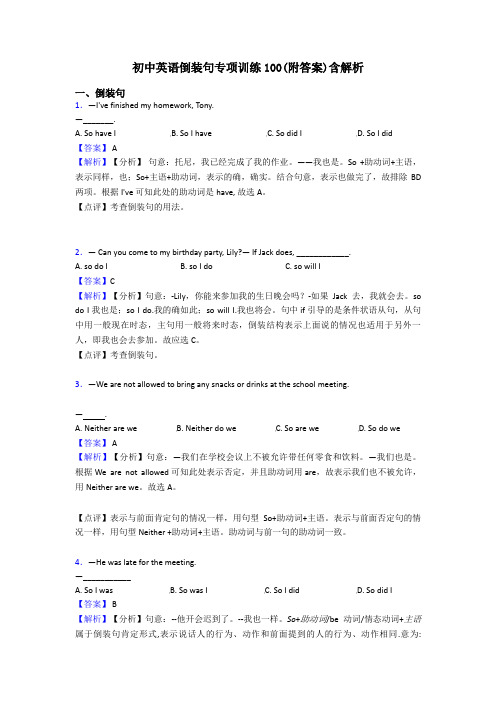
初中英语倒装句专项训练100(附答案)含解析一、倒装句1.—I've finished my homework, Tony.—_______.A. So have IB. So I haveC. So did ID. So I did【答案】 A【解析】【分析】句意:托尼,我已经完成了我的作业。
——我也是。
So +助动词+主语,表示同样,也;So+主语+助动词,表示的确,确实。
结合句意,表示也做完了,故排除BD 两项。
根据I've 可知此处的助动词是have, 故选A。
【点评】考查倒装句的用法。
2.— Can you come to my birthday party, Lily?— If Jack does, ____________.A. so do IB. so I doC. so will I【答案】C【解析】【分析】句意:-Lily,你能来参加我的生日晚会吗?-如果Jack去,我就会去。
so do I我也是;so I do.我的确如此;so will I.我也将会。
句中if引导的是条件状语从句,从句中用一般现在时态,主句用一般将来时态,倒装结构表示上面说的情况也适用于另外一人,即我也会去参加。
故应选C。
【点评】考查倒装句。
3.—We are not allowed to bring any snacks or drinks at the school meeting.— .A. Neither are weB. Neither do weC. So are weD. So do we【答案】 A【解析】【分析】句意:—我们在学校会议上不被允许带任何零食和饮料。
—我们也是。
根据We are not allowed可知此处表示否定,并且助动词用are,故表示我们也不被允许,用Neither are we。
故选A。
【点评】表示与前面肯定句的情况一样,用句型So+助动词+主语。
初中英语倒装句练习题
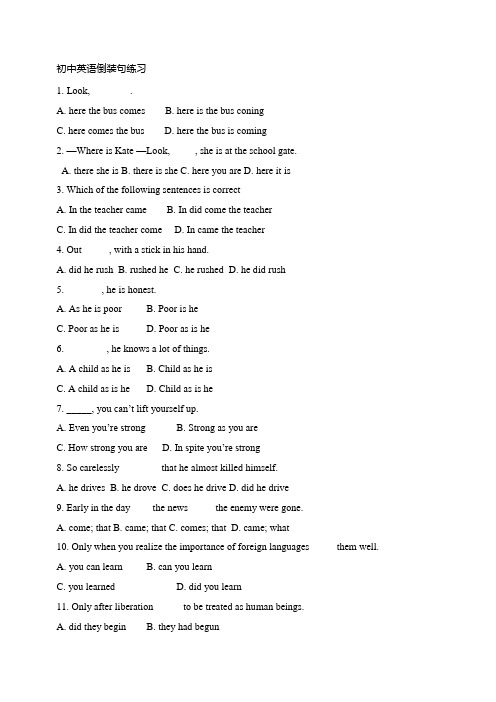
初中英语倒装句练习1. Look,________.A. here the bus comesB. here is the bus coningC. here comes the busD. here the bus is coming2. —Where is Kate —Look,_____, she is at the school gate.A. there she isB. there is sheC. here you areD. here it is3. Which of the following sentences is correctA. In the teacher cameB. In did come the teacherC. In did the teacher comeD. In came the teacher4. Out _____, with a stick in his hand.A. did he rushB. rushed heC. he rushedD. he did rush5. _______, he is honest.A. As he is poorB. Poor is heC. Poor as he isD. Poor as is he6. ________, he knows a lot of things.A. A child as he isB. Child as he isC. A child as is heD. Child as is he7. _____, you can’t lift yourself up.A. Even you’re strongB. Strong as you areC. How strong you areD. In spite you’re strong8. So carelessly ________that he almost killed himself.A. he drivesB. he droveC. does he driveD. did he drive9. Early in the day ____the news _____the enemy were gone.A. come; thatB. came; thatC. comes; thatD. came; what10. Only when you realize the importance of foreign languages_____ them well.A. you can learnB. can you learnC. you learnedD. did you learn11. Only after liberation _____ to be treated as human beings.A. did they beginB. they had begunC. they did beginD. had they begun12. Not only ____ to stay at home, but he was also forbidden to see his friends.A. he was forcingB. he was forcedC. was he forcingD. was he forced13. Not until his father was out of prison____ to school.A. can John goB. John can goC. could John goD. John could go14. Never before _____ seen such a stupid man.A. am IB. was IC. have ID. shall I15. Rarely ____such a silly thing.A. have I heard ofB. I have heard ofC. am I heard ofD. had I heard of16. Little _____ about his own health though he was very ill.A. he caredB. did he careC. does he careD. he cares17. Only when _____ in the afternoon _____ able to leave.A. the match was over; they wereB. was the match over; were theyC. was the match over; they wereD. the match was over; were they18. Hardly ____ down ____ he stepped in.A. had I sat; thanB. I had sat; whenC. had I sat; thenD. had I sat; when19. No sooner _____asleep than she heard a knock at the door.A. she had fallenB. had she fallenC. she had fellD. had she fell20. She did not see Smith. ________.A. Neither did IB. Nor didn’t IC. Neither I didD. So didn’t I21. In front of the farmhouse ______.A. lay a peasant boyB. laid a peasant boyC. a peasant layD. did a peasant boy lie22. —You ought to have given them some advice.—_____, but who cared what I saidA. So ought youB. So I oughtC. So did youD. So I did23. —It was hot yesterday. —_____.A. It was so.B. So was it.C. So it was.D. So it did24. No longer _____ to be monitor of the class.A. is he fitB. he is fitC. he fitD. fit be25. —You like football very much. —________.A. So do IB. So I doC. I do tooD. It is the same with me26. Only by practicing a few hours every day___ be able to master the language.A. you canB. can youC. you willD. will you27. Hardly _____ the bus stop ___ the bus arrived.A. we had got to; whenB. we had got to; thenC. had we got to; thanD. had we got to; when28. —Where is your brother —There ______.A. he is comingB. he comesC. comes heD. does he come29. _____ earlier you would have met him.A. If you cameB. If you did comeC. Did you comeD. Had you come30. Not only ____ polluted but ____crowded.A. was the city; were the streetB. the city was; were the streetthe city; the streets city was; the streets were31. She is a teacher and works at the college. _______.A. So is Li MingB. So does Li MingC. So is it with Li MingD. So it is with Li Ming32. Now ___ Tom’s turn to recite the text.A. there isB. is goingC. has comeD. comes34. _______ reading and speaking English every day, he would speak it well enough now.A. Had he practicedB. Did he practiceC. Should he practiceD. Were he to practice35. Nearby _____ in which they had spent their summer vacation.A. was two housesB. two houses wereC. were two housesD. are two houses36. Not only a writer but also ______ here.A. an actor was wantedB. was an actor wantedC. an actor were wantedD. were an actor wanted37. So tired ____ after a whole day’s heavy work that I ____ stand on my feet.A. was I; could hardlyB. was I felt; could hardlyC. was I; couldn’t hardlyD. I was; hardly couldn’t39. After that we never saw her again, nor ________ from her.A. did we hearB. we heardC. has we heardD. we have heard40. Not until I began to work _____ how much time I had wasted.A. didn’t I realizeB. did I realizeC. I didn’t realizeD. I realize43. Not until all the fish died in the river _____ how serious the pollution was.A. did the villagers realizeB. the villagers realizedC. the villagers did realizedD. didn’t the villagers realize44. Little _____ about his own safety, though he was in great danger himself.A. does he careB. did he careC. he caresD. he cared45. —David has made great progress recently.—_______, and _______.A. So he has; so you haveB. So he has; so have youC. So has he; so haveD. So has he; so you have46. —It was careless of you to have left your clothes outside all night.—My God ______.A. So did IB. So I didC. So were youD. So did you47. Not a single song ________ at yesterday’s party.A. she sangB. sang sheC. did she singD. she did sing48. _____ the people have become masters of their own country that science can really serve the people.A. Only thenB. It is only thenC. Only whenD. It is only when49. Not only _______ difficult to understand, but it was too long.A. it wasB. it madeC. did it makeD. was it50. Only when the rain stopped _____ again.A. the match startedB. does the match startC. did the match startD. the match had started51. ______ had I finished my translation when the class was over.A. NeverB. No soonerC. HardlyD. How52. In _______ and the lesson began.A. he cameB. came heC. he comesD. comes he53. On the wall ______ two large pictures.A. hangsB. hangC. hangedD. are hanging54. Such ______ the results of the experiments.A. isB. wasC. areD. as be55. —They have done a good job. —________.A. So they have doneB. So they haveC. So have theyD. So is it56. ______ he realized it was too late to return home.A. No sooner it grew dark thanB. Hardly did it grow dark whenC. It was not until dark thatD. It was until dark that57. _____, Mother will wait for him to have dinner together.A. However late is heB. However he is lateC. However is he lateD. However late he is58. _____ hot is the sun that we cannot go out at present.A. VeryB. TooC. SoD. Such1.在以here、there、 now 、 then 、 up、down 、 in 、out 、off、away等表示运动方向的副词或地点状语置于句首以示强调,句子要全部倒装;如:正常: The birds flew away. 倒装:如:铃响了译:公车来了译:那个男孩走开了译:小孩子冲了出来译:注:当主语是人称代词时主谓不倒装.如:他走开了译:她来了译:2. 表示地点的介词短语位于句首时;如:正常:A beautiful lake lies at the foot of the hill.倒装:A little dog sits outside the room.倒装:A statue, the star of hope lies on the riverside .倒装:A watchtower stands on top of the hill.倒装:3. only加状语需要部分倒装I realized the importance of learning English.倒装:Only thenI seldom go to the cinema.倒装:He didn’t finish his homework until his mother came back.倒装:4、as/ though 虽然,尽管引导的让步状语从句名词\形容词\副词\动词\分词+as\though+主语+其他Although I am ugly, I am gentle.倒装:Though he is a child, he has to make a living.倒装:注意:从句的表语是名词,其名词前不加任何冠词5. 前句是肯定句用So 某人/某事也是结构:So +be/助动词/情态动词+主语前句是否定句用neither/ nor某人/某事也不是结构:Nor/neither +be/助动词/情态动词+主语He has been to Beijing.我也去过:Tom can’t answer the question.我也不能:他喜欢读书,我也是.He likes reading very much. .我从来没有去过广州大学,他也是.I have never been to Guangzhou University, .6. So +主语+be/助动词/情态动词某人确实如此Betty is a nice girl.她确实是;7. 在hardly/scarcely/…when;no sooner…than; not only … but also;so...that; such…that 的倒装句中,前倒后不倒.hardly/scarcely/ no sooner后句子的谓语用had done, when/than后句子的谓语用一般过去时2我一到车站,火车就开始启动;No sooner than train .3 他不仅对足球感兴趣,而且也踢得很好;Not only but also8. If 虚拟条件从句中.从句有were/should/had1If I were you, I would work hard.倒装:2 If it should rain tomorrow, we would put off our meeting.倒装:3If he had followed my advice, he would have succeeded.倒装:答案:1—5 CADCC 6—10 BBDBB 11—15 ADCCA 16—20 BDDBA21—25 ADCAB 26—30 DDBDC 31—35 DDAAC 36—40 AABAB41—45 BBABB 46—50 BCDDC 51—58 CABCB CDC。
初二英语倒装结构练习题30题含答案解析

初二英语倒装结构练习题30题含答案解析1.Never have I seen such a beautiful school.So beautiful is this school that I can't help taking pictures.Such a beautiful school is it that I can't help taking pictures.As beautiful as this school is, I can't help taking pictures.答案解析:第一句是部分倒装句,否定词never 位于句首,句子用部分倒装,即把助动词have 提到主语I 前面。
第二句是so...that...句型,so 位于句首,句子用部分倒装,即把系动词is 提到主语this school 前面。
第三句也是部分倒装句,such...that...句型中,such 位于句首,句子用部分倒装,即把系动词is 提到主语it 前面,这里的it 指代this school。
第四句是as 引导的让步状语从句,句子用部分倒装,即把形容词beautiful 提到as 前面,但这里不是部分倒装的典型用法。
所以第一句正确。
2.Seldom does he come to school late.He seldom comes to school late.Hardly he comes to school late.Rarely he comes to school late.答案解析:第一句是部分倒装句,seldom 位于句首,句子用部分倒装,即把助动词does 提到主语he 前面。
第二句是正常语序。
第三句和第四句错误,hardly 和rarely 位于句首时,句子要用部分倒装,即把助动词或be 动词或情态动词提到主语前面。
所以第一句正确。
3.Not only does he study hard, but also he is polite.He not only studies hard, but also is polite.Not only he studies hard, but also is polite.He studies hard not only, but also is polite.答案解析:第一句是部分倒装句,not only...but also...连接两个句子时,not only 位于句首,前半句用部分倒装,即把助动词does 提到主语he 前面。
初中英语倒装句专项训练20题

初中英语倒装句专项训练20题1. Here comes the bus. (这是一个完全倒装句,正常语序是The bus comes here. )2. Out rushed the children. (正常语序是The children rushed out. )3. Away flew the bird. (正常语序是The bird flew away. )4. Down came the rain. (正常语序是The rain came down. )5. There stands a tall tree. (正常语序是A tall tree stands there. )6. Never have I seen such a beautiful place. (解析:否定词never 前置,句子使用部分倒装,将助动词have 提到主语I 之前。
)7. Not only does he like music, but also he plays the piano well. (解析:Not only 位于句首,句子使用部分倒装,将助动词does 提到主语he 之前。
)8. Seldom does she go to the cinema. (解析:否定词seldom 前置,句子使用部分倒装,将助动词does 提到主语she 之前。
)9. Hardly had I reached the station when the train left. (解析:Hardly 位于句首,句子使用部分倒装,将助动词had 提到主语I 之前。
)10. Little did he know about the news. (解析:否定词Little 前置,句子使用部分倒装,将助动词did 提到主语he 之前。
)11. She likes swimming, so do I. (解析:前句表示“她喜欢游泳”,后句用“so + 助动词+ 主语”表示“我也喜欢”)。
初中英语倒装句专项训练100(附答案)

初中英语倒装句专项训练100(附答案)一、倒装句1.—My brother and I will go to the library tomorrow.— . Shall we go together?A. So do IB. So I doC. So will ID. So I will【答案】 C【解析】【分析】“so+助动词(情态动词或连系动词)+另一主语”,此句型是主谓倒装结构,可以表示前面的情况也适用于后者,使用该句型需要注意以几个方面的问题:1.该句型只能用于肯定句,不能用于否定句:如果前句是否定句,则要用“neither /nor +助动词+主语”。
2.句型中的主语与上文中的主语是不同的两个主语3.句型中助动词,包括连系动词和情态动词的时态要和上句中谓语动词的时态相一致。
句意:我的哥哥和我明天要去图书馆。
根据下文,我们一起去吗?可知上文情况同样适用于后者,故用主谓倒装结构,上文是将来时态,选C。
【点评】这几个倒装句的区别比较难。
“so+助动词(情态动词或连系动词)+另一主语”,表示前面的情况也适用于后者。
So+主语+助动词(情态动词或连系动词)是对上文所说的情况加以肯定。
如果上文是否定形式则要将so换成neither。
2.— I can't stand (忍受) the air pollution in this city any more. It is getting more terrible.— ________. We've never had so many factories before.A. Neither I can .B. Neither can IC. So I can.D. So can I.【答案】 B【解析】【分析】句意:-我不能在忍受这个城市里的空气污染了,它变得更糟糕了。
-我也不能,我们以前从来没有这么多工厂。
Neither也不,是否定意思,位于句首,应该用倒装,故A不对;C和D应该用于肯定句中,这里是否定句。
- 1、下载文档前请自行甄别文档内容的完整性,平台不提供额外的编辑、内容补充、找答案等附加服务。
- 2、"仅部分预览"的文档,不可在线预览部分如存在完整性等问题,可反馈申请退款(可完整预览的文档不适用该条件!)。
- 3、如文档侵犯您的权益,请联系客服反馈,我们会尽快为您处理(人工客服工作时间:9:00-18:30)。
(英语)初中英语倒装句练习题一、倒装句1.——My brother and I will go to the library tomorrow.—— ___. Shall we go together?A. So I doB. So do IC. So will ID. So I will【答案】 C【解析】【分析】句意:---明天我弟弟和我将要去图书馆。
---我也要去。
我们能一起去吗?表示某某人也一样,用So+be/助动词/情态动词+主语。
明天要去,应用情态动词will。
故选C。
【点评】考查倒装句的用法。
2.— I think the plan is just a waste of time. What do you think?— Well, if you don't support the plan, ________.A. neither do IB. so do IC. neither will ID. so will I【答案】 C【解析】【分析】句意:——我认为这个计划只是在浪费时间。
您是怎么想的?——好,如果你不支持这个计划,我也不支持。
Neither+助动词+主语,表示主语也不是……;这里是if引导的条件状语从句,主句用一般将来时,从句用一般现在时态,这里是主句,故助动词用will。
根据题意,故选C。
【点评】考查倒装句,注意Neither+助动词+主语,表示主语也不是这样;so+助动词+主语,表示主语也是这样。
3.—Oh, my god! Recently I have put on 5 pounds.— . I think I should lose weight.A. So do IB. So have IC. Neither do ID. Neither have I【答案】 B【解析】【分析】句意:—啊,我的天呀!最近我长胖了五磅。
—我也是,我认为我应该减减肥了。
so +主语+助动词/情态动词/系动词:某某确实如此,主语与上文是同一人。
So+助动词/情态动词/系动词+主语:某某也如此,主语与上文不是同一人,表示后者适合前者。
上文是否定句,下文表示某某也不,用 neither +助动词+主语。
这些句式在时态上与前一个句子相同。
根据上句是肯定句,现在完成时态,主语与上句不同,故选B。
【点评】考查固定结构,牢记并熟练运用此结构,能举一反三,应对自如。
4.— My mother hardly watches any sports shows.—_________A. So do mine.B. So does mine.C. Neither do mine.D. Neither does mine.【答案】 D【解析】【分析】句意:—我妈妈几乎不看任何体育节目。
—我的妈妈也不看。
当A做的事,B和A做了相同事时,B说“So+助动词/情态动词…+B”;当A没做某事,B也没做,B 可说“Neither/nor+助动词/情态动词…+B”。
mine指的是my mother,根据主谓一致原则,可知使用助动词does,结合句意和语境可知选D。
【点评】此题考查倒装结构和情景交际。
5.—Many students won 't take part in the after-school activities today.— .We have so much homework to do!A. So will IB. So do IC. Neither will ID. Neither do I【答案】 C【解析】【分析】句意:—今天许多学生不愿意参见课外活动。
—我也不愿意。
我们有那么多作业要做。
So+助动词+主语,表示与前面的肯定形式一致,表示也。
Neither+助动词+主语,表示与前面的否定形式一致,表示也不。
这两种部分倒装结构中的助动词与前一句的助动词一致,根据Many students won 't take part in the after-school activities today.可知此处won't表示否定形式,故用Neither+will+主语,故选C。
【点评】此题考查倒装句。
注意助动词与前一句的助动词一致。
6.— Can you come to my birthday party, Lily?— If Jack does, ____________.A. so do IB. so I doC. so will I【答案】C【解析】【分析】句意:-Lily,你能来参加我的生日晚会吗?-如果Jack去,我就会去。
so do I我也是;so I do.我的确如此;so will I.我也将会。
句中if引导的是条件状语从句,从句中用一般现在时态,主句用一般将来时态,倒装结构表示上面说的情况也适用于另外一人,即我也会去参加。
故应选C。
【点评】考查倒装句。
7.—Peter doesn't know many people here.—______A. So do IB. So am IC. Neither am ID. Neither do I【答案】 D【解析】【分析】句意:---皮特在这认识的人不多。
——我也是。
考查倒装句:So+助动词+主语,……也是这样,表示与前文描述的肯定的情况一致;Neither+助动词+主语,……也不是,表示与上文描述的否定的情况一致。
根据上一句可知是否定结构,助动词是does,所以用Neither do I,故答案为D。
【点评】考查倒装句的用法,掌握基本结构,根据语境判断选项。
8.—My brother got up very early last Sunday.—________.A. So I didB. So I wasC. So did I【答案】 C【解析】【分析】句意:——上星期天我哥哥起得很早。
——我也是。
so+谓语+主语,……也是,so+主语+谓语,的确是,此处表示某人也是,因此用so did I,故选C。
【点评】考查固定搭配,注意so+谓语+主语的用法。
9.— I've decided to see the film tonight.— .A. So have IB. So do IC. So did ID. So will I【答案】 A【解析】【分析】句意:——我已经决定了今晚去看这部电影。
——我也已经决定了。
A、我也已经决定了;B、我也现在决定了;C、我也过去决定了;D、我也将会决定。
由上文I've decided to see the film tonight. 我已经决定了今晚看这部电影可知,下文要表达的是‘我也已经决定了’,故选A。
【点评】考查倒装句,so+动词+I句型,表示上述情况也适合于下一个说话的人,动词取决于上文。
10.— I have changed my job.— __________________.A. So do IB. So have IC. So I doD. So I have【答案】 B【解析】【分析】句意:——我已经换了工作。
——我也是。
根据时态是现在完成时故助动词是have,故排除A和C选项,so+助动词+主语,……也是,so+主语+助动词,的确是,此处表示我也是,故选B。
【点评】考查省略句,注意so+助动词+主语的用法。
11.Only in this place ________ such beautiful water and mountains.A. we can findB. can we findC. we foundD. found we【答案】 B【解析】【分析】句意:只有在这个地方我们可以找到如此美丽的水和山。
only+状语(介词短语)位于句首,其后要部分倒装,故把情态动词后助动词放在主语前,情态动词+主语+谓语的语序,故选B。
【点评】考查倒装句,注意only+状语(介词短语)位于句首,其后要部分倒装的用法。
12.–The weather is very cold these days.– .A. So do IB. So is itC. So it is【答案】 C【解析】【分析】句意;这些日子天气非常寒冷。
确实如此。
So+助动词/情态动词/系动词+主语:某某也如此;so + 主语+助动词/情态动词/系动词+主语:某某确实如此。
该句式在时态,人称上与前一个句子相同。
结合语境选C【点评】考查倒装句。
13.--Peter knows many people here.---_________________A. So do IB. So am IC. Neither am ID. Neither do I【答案】 A【解析】【分析】So do I我也一样;So am I.我也是;Neither am I我也不;Neither do I 我也不。
句意:彼得认识这儿的许多人。
结合语境可知上文为一般现在时态,主谓结构,故选A。
【点评】这几个倒装句的区别比较难。
“so+助动词(情态动词或连系动词)+另一主语”,此句型是主谓倒装结构,可以表示前面的情况也适用于后者,使用该句型需要注意以几个方面的问题:1.该句型只能用于肯定句,不能用于否定句:如果前句是否定句,则要用“neither /nor +助动词+主语”。
2.句型中的主语与上文中的主语是不同的两个主语3.句型中助动词,包括连系动词和情态动词的时态要和上句中谓语动词的时态相一致。
另一句型so+主语+助动词是指对上文的肯定,起加强作用。
14.— I can't stand (忍受) the air pollution in this city any more. It is getting more terrible.— ________. We've never had so many factories before.A. Neither I can .B. Neither can IC. So I can.D. So can I.【答案】 B【解析】【分析】句意:-我不能在忍受这个城市里的空气污染了,它变得更糟糕了。
-我也不能,我们以前从来没有这么多工厂。
Neither也不,是否定意思,位于句首,应该用倒装,故A不对;C和D应该用于肯定句中,这里是否定句。
故选B。
15.—I've finished my homework, Tony.—_______.A. So have IB. So I haveC. So did ID. So I did【答案】 A【解析】【分析】句意:托尼,我已经完成了我的作业。
